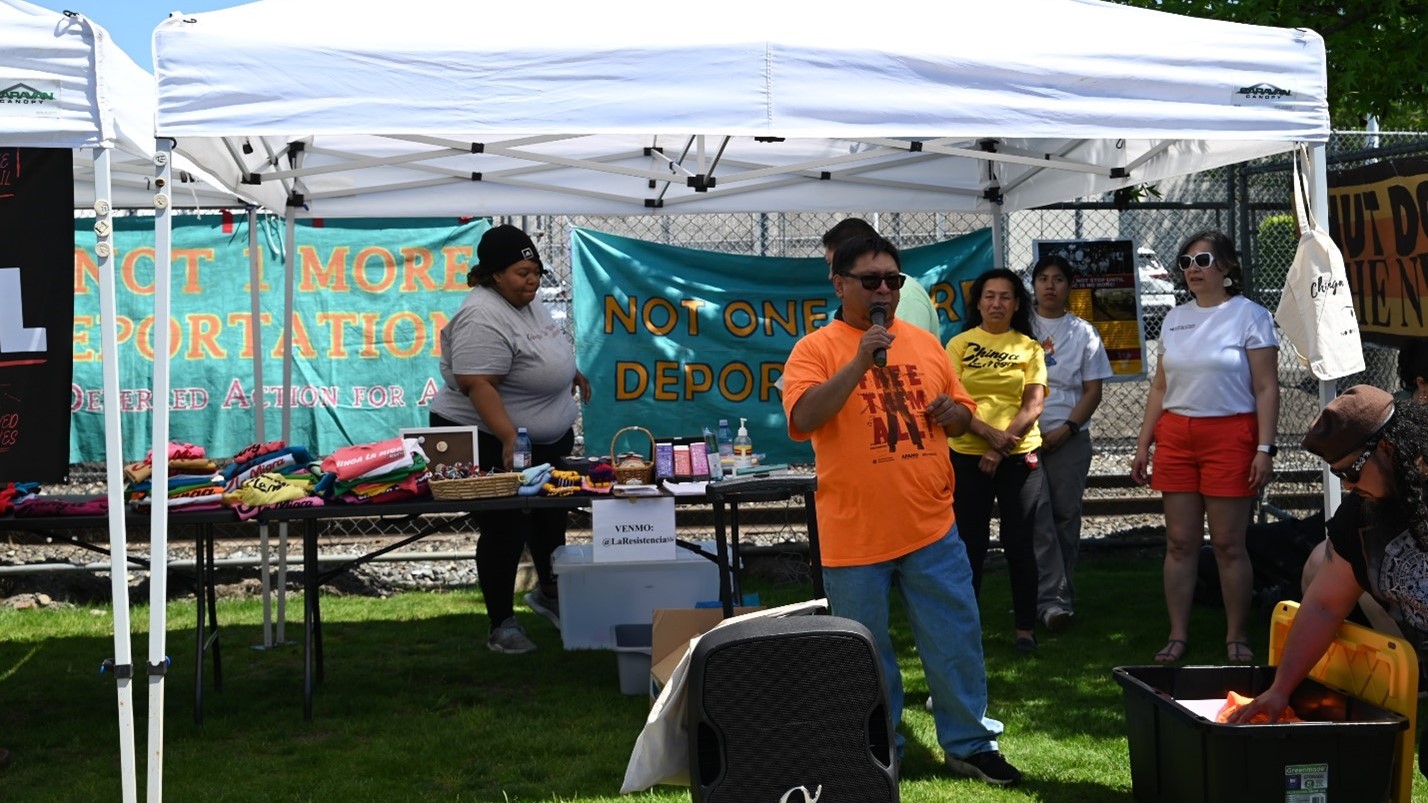
Pedro Sosa speaks outside the Northwest Detention Center in Tacoma, WA. Alonso Oliveros
Justice. That word carries many connotations to many of us. For myself, I view it as the actions to intervene and bring about change for an imbalance in how our human-designed laws, rules, regulations and conditions were created by the prevailing dominant ruling class. Ultimately, we strive to right the wrongs in how our laws ought to be applied fairly and equally to everyone so that all can benefit from having their voice heard.
Those who do not follow these or “choose” not to follow these rules because they either don’t care or don’t see a need to “play by these rules” and break the social contract that is the bedrock of a harmonious society. Thus, we create consequences and punishments so that we can keep them in line and make them regret that they did not follow our rules.
Such is the case with jails and correctional facilities that are used to house humans who are viewed as having “bad moral characters” and lack any ethics that they take advantage of our compassion only to spit it back to our faces. Only by imposing harsh sentences do they learn their lesson and think about paying their debt to society.
Whatever you may think about the cruelty of prisons, make no mistake, we have created a for-profit prison system that benefits from US taxpayer funds, meaning your tax dollars, because we all sleep better knowing that such people are being held in check for the crimes that they committed.
In the case of immigration detention centers, we punish and jail people whose only “crime” is having migrated to the US to work to provide a better life for themselves and their families. It’s not even technically a crime but rather a civil violation, meaning our local and state law enforcement have no legal jurisdiction to arrest and detain someone without immigration status solely because they were born outside of the US.
And yet we have created a parallel for-profit prison system that does just that, using federal tax dollars because we have deemed undocumented people with such egregious contempt as to be “deserving” of the same incarceration and inhumane/cruel punishment.
But you say that we have never done this to a community that never broke the rules and were forced to pledge loyalty to our county? Lest we forget that we did this to Japanese Americans during World War II in the form of government-run “internment camps” which really were concentration camps. Not only did they suffer atrocities and were deemed “un-American,” but they also had their properties and assets confiscated, most of which were sold and never reclaimed.
Both the present-day immigrant detainee and Japanese American concentration camp experience provide us with one commonality: both oppressed populations and their traumatic incarceration instill in those of us who were/are indifferent to such cruelty a sense of supremacy and domineering sense of entitlement that such heinous acts are our own reassurances of safety.
Fear of immigrants is such a motivating factor that we undermine its influence on why we create such mechanisms for deciding who and what groups get to “belong” with us.
Today though, many of the descendants of the Japanese American concentration camp detainees recognize that the suffering of today’s detained immigrants mirrors the experiences of their ancestors. Organizers with Tsuru for Solidarity work to end detention sites and support front-line immigrant and refugee communities that are being targeted by racist, inhumane immigration policies.
Oregon Project Voice organizes the annual Free Them All caravan to join our partners, La Resistencia and Latinos Unidos Siempre (LUS), to take action to stop the Northwest Detention Center (NWDC) located in Tacoma, WA.
Opened in 2004, the NWDC is an immigration detention center privately owned and operated by the GEO Group under contract with the US Immigration and Customs Enforcement (ICE). The NWDC has a current capacity of 1,575 detainees, making it one of the largest for-profit prisons.
This year, Tsuru for Solidarity will host their first Liberation Obon festival on September 1, 2024, outside of the NWDC. Obon is a Japanese and Japanese American festival to celebrate loved ones and friends who have gone before us. It shares similarities with the traditional Mexican and Central/South American Day of the Dead celebrations honoring ancestors.
The goal is to bring more awareness and collaboration among communities to highlight the injustice of wrongful and inhumane incarceration to close the NWDC. Activities will include:
-Traditional circle and street folk dancing
-Children’s art making
-Giant Daruma
-Healing ceremonies
-Speakers from inside NWDC sharing their experiences
The legacy of dehumanizing incarceration of individuals working hard to provide for their families and punishing them for their sacrifice is alive and well in our for-profit immigrant detention centers.
Will you join us to help stop repeating this shameful history?